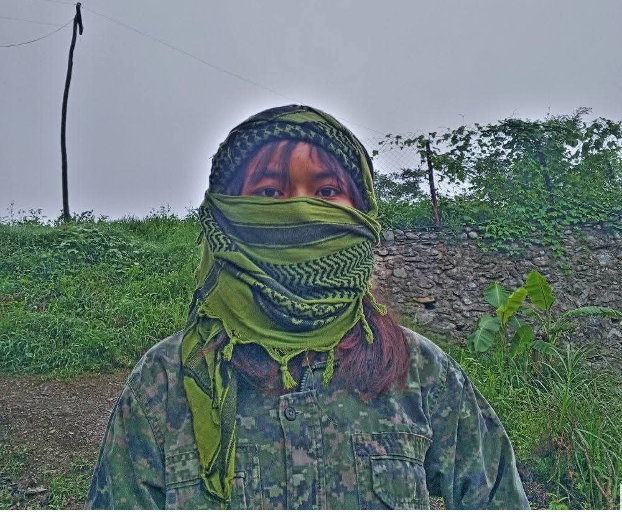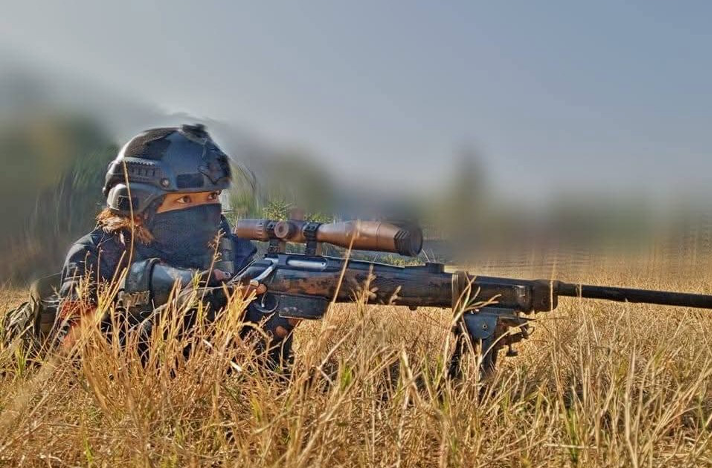An interview with PDF-Zoland’s female sniper GiGi
Across Myanmar, people who rejected the military coup initially expressed their opposition through peaceful protests. However, after the military junta forces began violently cracking down on unarmed civilians, young people nationwide joined the armed resistance. For over four years now, they have been fighting to dismantle the military dictatorship, a struggle that continues to this day.
Among these many young individuals is GiGi, a 20-year-old former Grade-10 student. GiGi joined the People’s Defense Force-Zoland (PDF-Zoland) in 2022, operating in Tedim Township in northern Chin State. She became a rare female sniper and currently serves as a section commander within the group.
In this interview, GiGi, a member of PDF-Zoland, discusses the reasons she joined the armed resistance, her decision to work as a female sniper, and the challenges she has faced as a woman in the resistance forces.

Q: What did you do before joining this resistance?
A: Before joining the resistance, I was attending Grade 10, you know. But because of the COVID-19 pandemic, schools kept closing and reopening. Then the coup happened, so I couldn’t take my 10th-grade exams. Back then, I was 17 years old. Now I’m 20.
Q: Why did you decide to join the armed resistance? When did you start participating in it?
A: The very first reason is that I don’t want a military dictatorship. Then there’s the fact that our generation is dealing with the consequences of this dictatorial system. I want to uproot it so that the next generations won’t have to face this kind of rotten system anymore. Because even my parents went through this oppressive system themselves. Especially in places like ours, the Chin hills, they’d tell me how the dictators ruled the people without an ounce of humanity—how they oppressed us, tortured us, took people’s possessions, and destroyed everything. And now, we’re facing it ourselves.
The military doesn’t treat us like humans anymore. We keep hearing about how they torture and torment people—whether it’s online or from those around us. Especially targeting our generation, the young people—they arrest us, kill us, and it doesn’t stop there. When you see and hear about things like them burning people alive, you can’t just sit still. Their actions aren’t something that’ll end if we just stand by and watch. Even if we can’t stop this evil once and for all right away, I felt we had to express what we’re feeling. That’s why I joined the resistance myself.
Q: As a woman, what challenges did you face when you joined the armed resistance? How did you overcome those challenges?
A: To be honest, as a woman, there are a ton of challenges, you know. Just being in the jungle already brings difficulties for women. I don’t mind them too much. What’s harder to deal with is when some guys think that because I’m a woman, I can’t handle a weapon. That kind of underestimation—I really can’t stand it. I don’t know how others feel about it.
But for me, the moment I decided to join this resistance, I came in to take up a gun. In this revolution, among those of us who’ve joined, there’s no discrimination based on gender. I see it as men and women being equal. So I can’t tolerate being looked down on. I came here to fight the military dictatorship, and I often show just how much girls like us can do too.
Q: Why did you choose to become a sniper? What efforts did you make to achieve that?
A: Girls usually don’t get sent to the front lines much. So I thought if I became a sniper, they’d have no choice but to send me to the front—that was my hope when I joined, you know. When the revolution started, I listened to the news and heard that you could take training courses with groups like PDF-Zoland or China National Army (CAN) to join the armed fight. I wanted to sign up. Even back then, I’d already decided that if I joined an armed group, I’d become a sniper. So I joined PDF-Zoland. At the time, there were no female snipers yet. When they called for sniper training, it was only the guys who got called.
Us girls were left wondering, “When are they going to call us too?” We just kept hoping. Eventually, they started including girls, and that’s when I got to join, you know. Being a sniper means you need to know how to aim at targets and do calculations. That’s where math comes in. At first, when I had to do all those calculations, I was a bit scared, thinking, “Can I really do this?” But then I told myself, “This is what I want to do,” and with that mentality, I pushed myself. If there was something I didn’t understand, I’d ask the seniors over and over—probably to the point where they got tired of me! That’s how I worked hard to make it happen.
Q: What’s the most important thing for a sniper?
A: For a sniper, the target is the main thing. To handle that, a sniper needs to be precise, quick, and able to make firm decisions—like knowing how many clicks to adjust at 100 meters or how the wind speed affects the shot. Those details matter a lot. You’ve got to train for it, you know. For me, I’m preparing for the upcoming battle to take Tedim town. Whenever I get the time, I train myself as much as I can.
Q: As a sniper, have you participated in any battles? How did that happen?
A: So far, I’ve only been to the front line once. That was back in May 2024, during the battle in Tedim town. My friend and I—both snipers—planned to take turns keeping watch day and night, you know, that’s how we set it up. But the battle didn’t last as long as we expected.
Q: Can you tell us how many targets you’ve successfully hit?
A: That was during the time I went to the front line to take the micro outpost in Tedim town. We were positioned about 800 meters from the outpost. That day, I don’t know if the soldiers were just lucky or if I wasn’t meant to get a shot off—the weather wasn’t too cold, but it was cloudy, so I couldn’t see the targets clearly. Because of that, I haven’t hit any enemy targets yet.
Q: Are there many female snipers like GiGi?
A: When we took the training, there were four of us, you know. But some had to step back because of health issues, so now there are just two of us left.
Q: When did you complete your training? Did you train alongside the boys? Could you also tell us about the training?
A: It’s been about a year since I finished sniper training, you know. When we took it, there were 12 of us in total —8 boys and 4 girls. Right from the start, we had to shoot. At first, we practiced with small firearms, then later they had us use a 30-06 sniper rifle. The instructors would set a target for us each day—how many shots we had to take—and they graded us daily. By the grace of God, I ended up winning first place for marksmanship.
During the training, that’s when we had to do things the same as the guys. In other military training too—like PT running, frog jumps, or getting punished—everything was equal. There was absolutely no discrimination between men and women in the training. When it came to punishment, especially for section commanders and above, we’d get it even worse. If regular comrades got hit twice, a female section commander like me would still take more than a male comrade.
Q: Don’t women like you get to do everything the same as the men, whether it’s regular work or fighting in battles? Can you tell us about that?
A: The only time we got to do things equally with the boys was during training. We girls worked hard in training, hoping they’d give us assignments too. But once training was over, they sent us back to the kitchen. What I wanted was for it to be equal—not just training together, but afterward too. I didn’t want it to be like, “You’re a guy, so you go to the front line; you’re a girl, so you cook in the kitchen or do laundry.” That’d be nice if it wasn’t like that. Since we’re girls, they think we can’t run like the boys at the front line, that we’d be scared when we hear gunfire, or that we’d worry about not being able to retreat fast enough, you know.
But honestly, we joined training with the decision that we could carry a gun. We can do the same as the boys. I believe we can run at the front line just like them. Sometimes when the guys go to the front and the girls who don’t get to go get those condescending looks, it makes us feel like, “We can go to the front too—we can pull the trigger just as well.” Girls have their own skills and interests too—like in medicine, communications, or drone units—whatever they’re passionate about. I’d love it if they assigned tasks based on what we’re interested in.
Sometimes, when girls want to join in or do something but don’t get the chance—or just end up stuck with kitchen duty—it really gets us down. At times, we even ask ourselves, “Did we join this revolution just to cook?” The truth is, us girls can do more than just cook—we’ve got skills in other areas too. Ask us what we’re interested in. We’ve got talents. We’ll try our best at whatever we can do.
Q: The Spring Revolution we’re currently fighting has now entered its fourth year. I’d like to know what your hopes are for this resistance, little sister.
A: Right now, whether it’s the people or those carrying weapons, we’re starting to see the results of our efforts bit by bit. The revolution isn’t something where you say, “It’s not my problem.” It’s more like, “I need to contribute in some way too.” While young people are risking their lives—something they can’t get back—adults and parents who can’t join in person can still help with material things they can replace.
If even more people who haven’t yet joined the revolution start pitching in, imagine how much success we could achieve—it’s honestly exciting to think about. Even now, with the people’s help, we’ve been able to take towns in Chin State one by one, you know. Like the saying goes, “Unity is strength.” If all of us people come together and try hard, capturing towns will happen soon—we’ll take them all. I believe and hope we’re about to reach our goal.
Q: If you have any memorable moments from the revolution, could you share them with us?
A: I don’t know how it is for others, but for me, there’s a moment that was tough and unforgettable. It was during sniper training. The instructor woke us up at 5 a.m., took us to a place about 10 miles from the camp—no breakfast, no lunch, nothing to eat, just water to drink. Going there was fine—it was downhill, so it was easy enough. Plus, I wasn’t too hungry yet, so it worked out. But the way back? Oh man, it was all uphill.
By then, we’d run out of water too. We couldn’t cook rice, and I was starving and thirsty—even thinking about it now, I can feel that thirst. One of my girl friends couldn’t take it anymore—she couldn’t even carry her rifle. I didn’t want the boys to help, so I carried her gun for her. I can’t forget that. All day, we only got to eat one little Good Day biscuit. We didn’t get back to camp until 7pm, and only then did we eat a full day’s worth of food. That was how our instructor trained us.
Q: If there’s anything you’d like to add?
A: Honestly, I understand that the boys feel sorry for us girls and want to look out for us, and I’m grateful for that. But sometimes, I wish they’d ask what we want too. When they don’t let us do things or give us permission out of pity, it ends up making us feel small. That’s why I hope they’d understand our wishes too.


